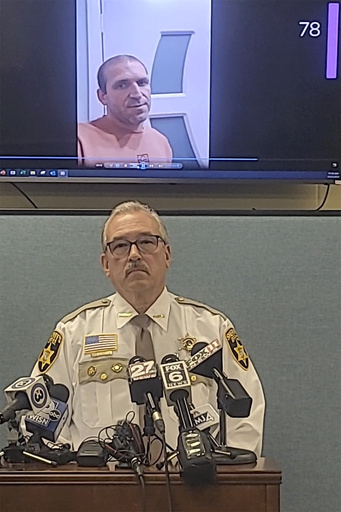
GREEN LAKE, Wis. — A man from Wisconsin who staged his own drowning this summer and left behind his wife and three young children has been discovered in Eastern Europe, where he is currently in touch with law enforcement officials. However, authorities report that he has not indicated any plans to return to his home country.
Sheriff Mark Podoll of Green Lake County revealed on Thursday that Ryan Borgwardt began responding to authorities on November 11 after they managed to track him down. The sheriff shared a video sent by Borgwardt from an undisclosed location, indicating his willingness to communicate, although he has not expressed intent to return home. Podoll noted that, at this time, there have been no criminal charges filed against Borgwardt, and he does not anticipate that legal action will be necessary while efforts are being made to appeal to his emotions for a return.
To better understand the situation surrounding Borgwardt’s disappearance, here are some key details:
Borgwardt, in his mid-40s, resided with his family in Watertown, Wisconsin, a city known for its German heritage and local schools. On August 12, the local sheriff’s office was informed that Borgwardt had not been heard from since the prior day, when he made a trip about 50 miles away to Green Lake for kayaking. His wife reported receiving a text from him at 10:49 p.m. stating that he was on his way to the shore.
In the search that followed his reported disappearance, authorities discovered Borgwardt’s vehicle and trailer near Green Lake. His overturned kayak was found in the lake, complete with a life jacket, in a depth area reaching about 200 feet. Additionally, a local angler found a fishing rod belonging to Borgwardt. The search for his presumed body continued over the course of more than 50 days, during which divers scoured the lake multiple times.
Investigators eventually pieced together clues regarding Borgwardt’s whereabouts, including the fact that he had reported his passport as lost or stolen prior to his disappearance and subsequently obtained a replacement. This led officials to suspect that he had orchestrated his drowning to escape and meet a woman in Uzbekistan, a country in Central Asia. Sheriff Podoll refrained from disclosing specific details about the woman but shared that law enforcement managed to reach Borgwardt with the help of a Russian-speaking female liaison.
Authorities confirmed Borgwardt’s identity through questions that only he would be able to answer and from the video he sent on November 11. Since then, he has been in regular communication with a member of the sheriff’s department, although Podoll stated that Borgwardt’s precise location remains unknown.
In the video message sent to law enforcement, Borgwardt, who appeared unsmiling and was dressed in an orange T-shirt, stated he was safe and secure in his apartment. He filmed the video mainly showing a door and bare walls while he referred to his situation.
As for how he staged his presumed death, Borgwardt recounted to authorities that he capsized his kayak, disposed of his phone within it, and used an inflatable boat to reach shore. He selected Green Lake for his ruse due to its status as Wisconsin’s deepest lake. After that, he reportedly cycled through the night on an electric bike, which he had hidden near a boat launch, covering approximately 70 miles to reach Madison. From Madison, he claimed to have taken a bus to Detroit and continued to Canada, where he boarded a flight. Law enforcement is still working to verify his account of the events.
As for his motivations, the sheriff indicated that Borgwardt’s actions were a response to “personal matters,” in his belief that this was the appropriate decision. Investigators also discovered that he had obtained a $375,000 life insurance policy in January for his family. “He thought he was doing what was best in his mind,” remarked Podoll.
Looking to the future, Borgwardt has yet to make a decision about coming back home, and any return will need to be a voluntary choice on his part. Deputies are emphasizing the significance of him returning to resolve the distress he has caused. The sheriff mentioned the possibility of Borgwardt facing charges for obstructing the investigation into his disappearance, although no such charges have been filed to date. The extensive search operation, which lasted over a month, is estimated to have incurred costs of at least $35,000. According to Podoll, Borgwardt initially believed the search would conclude within two weeks, and the primary concern for Borgwardt upon his potential return is how the local community would react to him.
